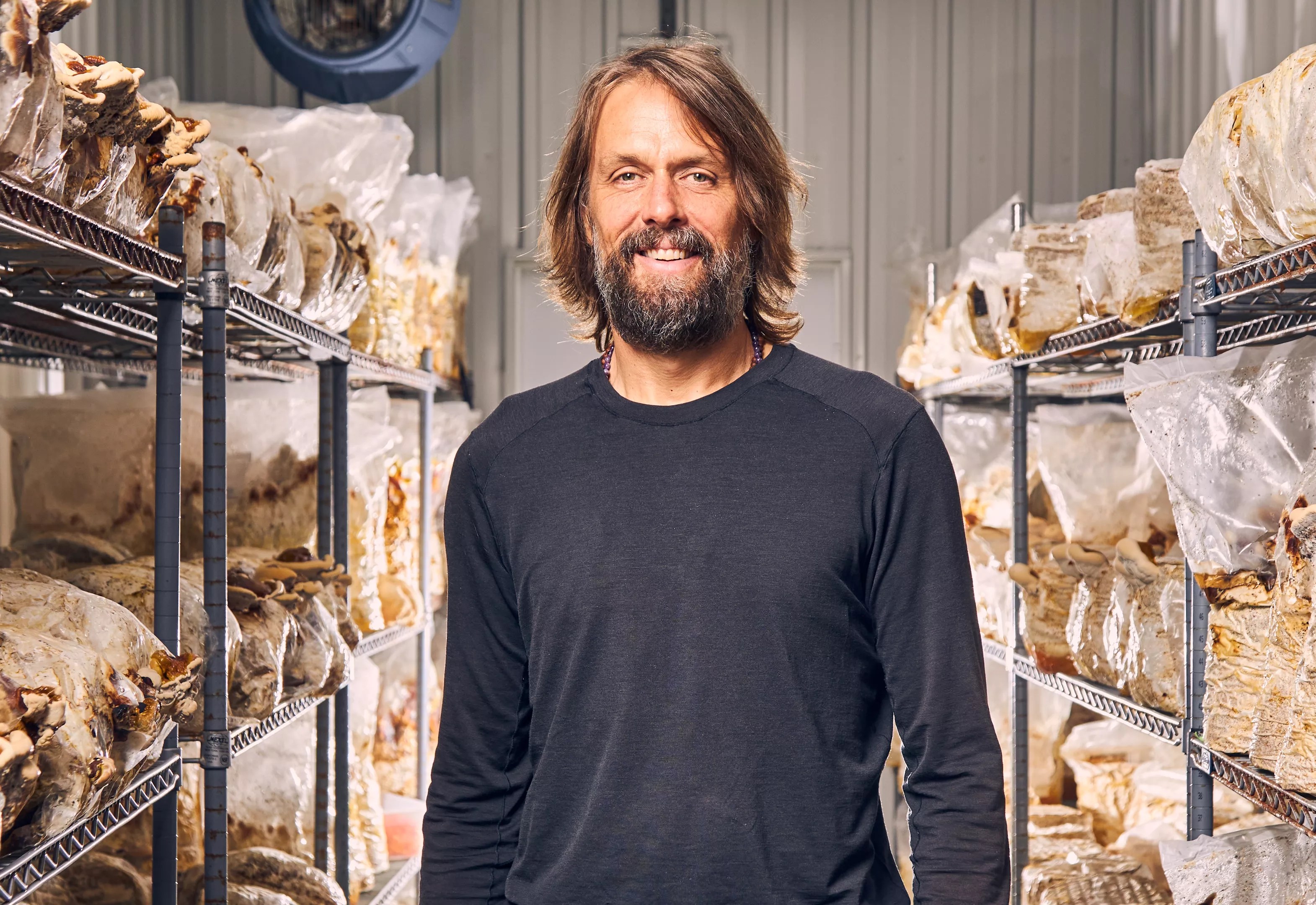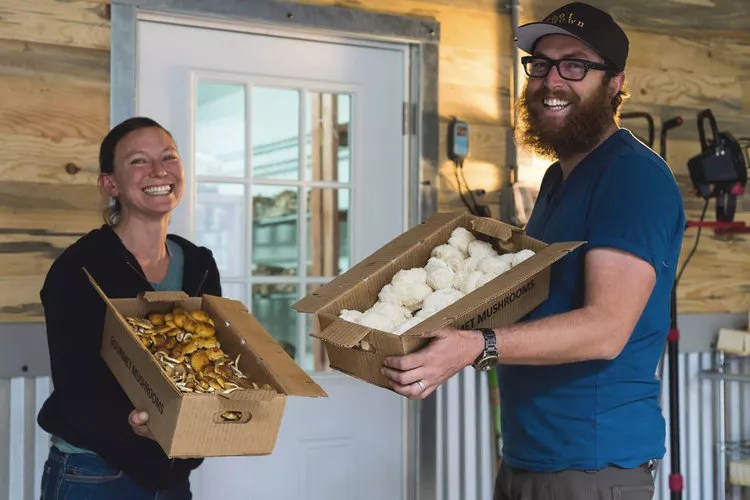
Linnea Covington

Audio By Carbonatix
If you ask someone to draw a mushroom, it’s likely that the doodle would be of a little rounded cap, reminiscent of a Smurf home or the kind of white button mushrooms that commonly come on pizza. But for Shane Schoolman, president of MyCOLove Farm in Fort Lupton, that grocery store staple is “the most boring mushroom ever.”
Since the passing of Colorado Proposition 122 in November, which decriminalized the personal cultivation, use and sharing of psilocybin, known for its psychedelic properties, there’s been a new boom in therapy, businesses and regulations surrounding that category of fungi.
But the rising popularity of mushrooms reaches far beyond those with hallucinogenic effects, particularly when it comes to functional and gourmet mushrooms.
Schoolman is, in many ways, a mushroom connoisseur. MyCOLove Farm is one of a small empire of functional mushroom companies sprouting up in the state. The varieties of fungi it produces are brightly colored and ornate in shape, and indeed make the button mushroom appear dull in comparison.

Cordyceps are one type of functional mushroom.
MyCOLove Farm
A graduate of the University of Colorado Boulder, Schoolman earned a degree in ecology and evolutionary biology in 2016. From there, he jumped into soil science and cannabis cultivation in Oregon. While attempting to understand the complexities of our soil microbiome, he became enamored of the fungal queendom, which he calls a “neglected mega-science.” Now, MyCOLove Farm is a fully fledged, 100 percent USDA organic functional mushroom farm.
You might liken the difference between psilocybin and functional mushrooms to the difference between THC and CBD, in that one gets you high while the other is focused on therapeutic effects. Examples of functional mushrooms include reishi, cordyceps, turkey’s tail and lion’s mane – types that are less familiar to many and can be consumed in a variety of forms.
Although psilocybin isn’t a part of Schoolman’s business model, he is supportive of the opportunities Prop 122 has created for the fungi community. “No knowledge is illegal, and it turns out that all mushrooms generally can be cultivated the same way. So it doesn’t matter what mushroom you want to grow – as long as it’s cultivable, you can learn to grow it,” he says, calling psilocybin a “gateway mushroom.”
“Functional mushrooms are a category of mushrooms that are 100 percent legal,” says Del Jolly, president of the functional mushroom company Umbo. “They have been used for thousands of years in Chinese medicine, in particular, and are in the category of adaptogens, which is like a supplement category,” he adds.

Jake Plummer wants to spread the good word about mushrooms.
Courtesy of Del Jolly
Even former Broncos quarterback Jake Plummer is in on the hype; he co-founded Umbo and believes in the power of functional mushrooms so much that he owns his own mushroom farm in Fort Lupton.
Unlike MyCOLove Farm, Umbo does have connections to psilocybin: Its profits are partially funneled toward the psychedelic research nonprofit Unlimited Sciences, which Jolly also co-founded. The group, along with Johns Hopkins, helped compile the largest data set in the world on how people use psilocybin mushrooms, and research using the data set is slated to be published in the coming months and years.
Adds Jolly: “The growth of psilocybin awareness is, I think, very much a catalyst for this modern surge of all things mushrooms, period.”
For Jolly and Schoolman, functional mushrooms offer a whole realm of opportunities for healing and health that is relatively unexplored. The National Institutes of Health notes that lion’s mane, for example, has demonstrated neurotrophic and neuro-protective effects. Animal studies have even shown that lion’s mane may help in memory function and loss associated with Alzheimer’s disease.
Functional mushrooms can be found in many different products: Plant Magic, a cafe on East 17th Avenue that offers information and resources for the healing power of plants, serves adaptogenic mushroom coffee infusions; Umbo makes functional mushroom snack bars, tinctures and capsules. There are even functional mushroom dog treats on the market.
In June, an event called the Mushroom Summit, which is focused on the functional mushroom industry, will take place at the Colorado Convention Center. “Functional mushrooms as a whole is the second-fastest-growing natural food supplement, if you will, next to CBD,” notes Jolly.
With such fast growth, research and regulations have yet to catch up. “When we got into the industry, we tripped over the bars that were set because they’re just way too low,” Schoolman says of functional mushrooms. “What we’re trying to do is set new standards for quality in the U.S.”

Liz and Michael Nail started Mile High Fungi out of their home in Denver in 2014.
Mile High Fungi
While functional mushrooms may be a new category, fungi have been a part of the culinary world for…ever. Now, though, “there’s a new mushroom farm startup like every month,” says Michael Nail, co-owner/founder of Mile High Fungi, a gourmet mushroom farm that debuted in 2014.
While gourmet mushroom farmers like Nail typically grow products to sell to restaurants and to consumers at farmers’ markets, Mile High Fungi has added a new revenue stream. During the pandemic, it started selling fruiting blocks to other growers, which allows new farms to get started quickly and easily.
While Nail is happy to see the growth in the gourmet mushroom movement, he wonders how many of the growers might transition once psilocybin becomes legal. “I’ll be curious to see what the legislation looks like from the psychedelic movement, whether or not a lot of these guys are just trying to get in position to transition or what, exactly,” he says.
David Muelken, founder of Monster Mushrooms, which sells grow kits and substrates for mushroom cultivation, calls the current period a mushroom “renaissance.” In the past couple of years, his company has expanded, now selling grow kits in over 120 stores nationwide.
Monster Mushroom does not sell psilocybin spores (its kits come with either oyster or lion’s mane varieties), but it will point interested parties in the right direction of legal, “reliable spore vendors that do sell them,” Muelken notes.
Mushroom foragers are also seeing an uptick in interest. “Our club has been around for 57 years,” says Jon Sommer, president of the Colorado Mycological Society. “We were about 150 to 250 members until four years ago, and now we’re 1,200 members.” The club hosts classes and workshops throughout the year, as well as a monthly lecture at the Denver Botanic Gardens.
“Some people come to us because they’re interested in edible mushrooms, some for scientific interests, some for ecological interest,” says Sommer. “Our size doubled during the pandemic.” The volunteer-led club continues to grow despite the fact that it decided to stop advertising. Those interested in foraging or becoming involved should attend one of the Colorado Mycological Society’s foraging trips, or “forays,” during the summer season.
“I’ve certainly noticed, just out foraging, that there’s been a significant increase in the number of people wandering around in the woods looking for mushrooms,” says Anna Marija Helt, a local herbalist, forager and writer who recently shared some of her photos of fungi that grow in Colorado with Westword. “We’re all kinda weirdos, mushroom people, you know, people that are really into to them. … But it’s a great community whether you’re talking about natural food chefs bringing them into high-end restaurants or foragers, or foraging guides. It’s a pretty neat community.”
For functional, gourmet and psilocybin mushrooms alike, the industry is changing rapidly. Some growers attribute the boom to the popular Netflix series Fantastic Fungi. Others note a big health push by consumers following the pandemic. But no matter what brings people into the mushroom world, those in the industry agree that its rise isn’t likely to slow down anytime soon.